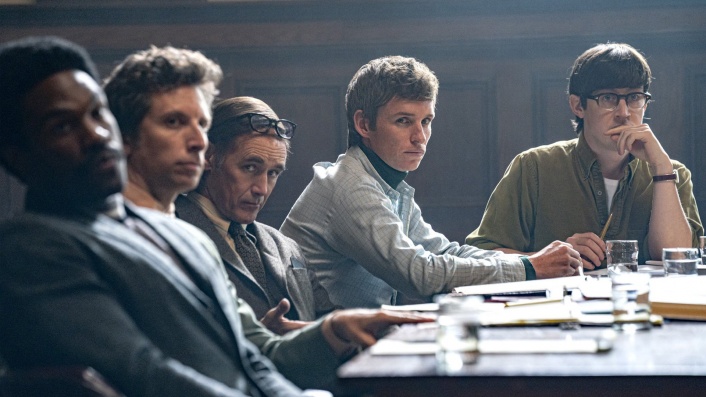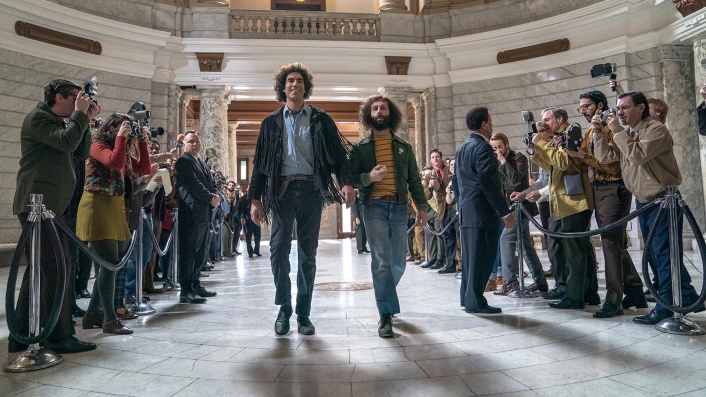The Trial of the Chicago 7 is glorious courtroom confection, Aaron Sorkin style

Based on a famous real-life court case, The Trial of the Chicago 7 (now on Netflix) is powered by a dynamite script from veteran word-slinger Aaron Sorkin. Here’s Luke Buckmaster’s review.
The slick patter of an Aaron Sorkin screenplay turns dry subjects—such as politics and legal matters—into irresistible confection. You gobble it up; you don’t notice when you’re full. His dialogue has the kind of silver-tongued polish all of us would love our own words to embody in real-life, if only we could have such quick wit. Or if only we could read from an invisible teleprompter pumped full of words from the playwright-cum-screenwriter-
See also:
* All new movies & series on Netflix
* All new streaming movies & series
Sorkin’s very entertaining new film unpacks the famous titular court case: one of those historical incidents with a clear narrative subtext built in, and an era-defining sentiment that crosses over into contemporary zeitgeist. Activists and police butted heads, to say the least, the former staging anti-Vietnam war protests during the 1968 Democratic National Convention. The American counterculture movement was then in a sense literally put on trial, the US government charging a motley group of progressives and beatniks for crimes that could have landed them in the slammer for a decade.
The events depicted feel fresh today. In part because The Trial of the Chicago 7 arrives with the Black Lives Matter movement raging in the background, giving extra oomph to Sorkin’s message about the police being wards of the state rather than friends of the people.
The fuzz are defended, then as now, by the same system they serve to uphold. Its putridity is illustrated through a variety of means including a love-to-hate performance from Frank Langella as the despicably conservative and hard-nosed judge Julius Hoffman, whose contempt for the accused spews like toxic gas from his dragon breath. Anybody who says it’s unrealistic to depict judges in a way that insinuates they often make their minds up long before assessing individual cases has a naive view of the legal system, and probably hasn’t been keeping up with the news lately.
Sorkin bolts out of the gate with an invigorating opening, full of his trademark verbal ping-ponging as he jumps between groups of activists preparing for the protest. Each represents different parts of it, making a point often overlooked in narratives about protests movements—that they are not cohesive wholes but splintered coalitions, with differing and diverse opinions as well as a broad intent gluing the factions together.

In a uni lecture theatre Alex Sharp (Rennie Davis) and Tom Hayden (Eddie Redmayne) inspire their audience with calls for social justice. Jerry Rubin (Jeremy Strong) and Abbie Hoffman (Sacha Baron Cohen), two long-haired ‘Yippies’, address a scruffier looking group in a grungier setting, using looser language, talking about how, hey, we’re not looking for trouble, but who knows what might happen. An older veteran activist, David Dellinger (John Carroll Lynch), packs his car, throwing placards in the back, while Bobby Seale (Yahya Abdul-Mateen II) talks fightin’ words to a fellow Black Panther, about tangoing with the police and maybe busting some heads.
Sorkin seems to have written the cuts between these scenes into the dialogue, which is not something you see (or hear) all that often—using audio as a form of editing. He does this by slicing off the end of a line then whooshing to a different character, in a different location, to take the line in another direction while maintaining the fluidity of the sentence. Take the following segue, from a serious and sombre Hayden in the lecture room to a jokey Hoffman speaking to a more relaxed group.
HAYDEN: Young people by busloads will go to Chicago to show our solidarity, and our disgust, but importantly—
CUT
HOFFMAN: To get laid by someone you just met.
Then, towards the end of Hoffman and Rubin’s pep talk, there’s the following segue between him and Dellinger.
HOFFMAN (addressing crowd): We’re going peacefully. But, if we’re met there with violence, you betta believe that we’re gonna (raises voice) meet that violence with—
CUT
DELLINGER (addressing his son): Non-violence. Always non-violence. And that’s without exception.
These transitions are flashy and a little gimmicky, but it’s more than empty style—establishing characters on the fly and setting them up as combustible, clashing personalities. By the time we hit the centrepiece flashback scenes, illustrating the day in question and arriving well into the running time, the process has matured, into a structure you might call scrambled if it weren’t so sharply configured. Sorkin for instance cuts between courtroom testimonies, and a stand-up comedy performance from Hoffman, to on-the-ground action, mixing timelines and perspectives and making it all energetically displacing.
The cast gobble up the Sorkinisms (like the audience!) and impress across the board. Jeremy Strong and Sacha Baron Cohen probably have the most difficult roles, needing to look and sound like stoner stereotypes (given their characters were, by the looks of things, real-life stoner stereotypes) but also provide enough authenticity to edge their performances away from unintentional parody. Mission: successful.
The real star of the show however is Sorkin’s writing. The French have a term called l’esprit de l’escalier (or ‘staircase wit’) that is used to describe the sensation of coming up with the perfect reply or riposte—but too late, after the fact. This sensation does not exist in Sorkin’s universes, where on-the-fly words are sculpted with instant perfection.
In other Sorkin productions (such as The Newsroom and Steve Jobs) that wit can come across as smug, and the bouncy to-and-fro of his dialogue can feel exhaustingly showy and repetitive. Here it works a treat, with various kinds of courtroom grandstanding, all the way to a rousing finale accompanied by swelling violin strings. Almost cheesy but not quite. It’s confection; glorious confection.

















